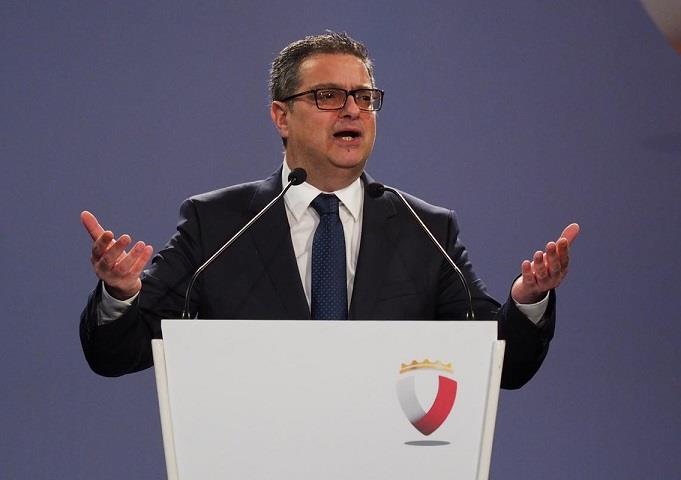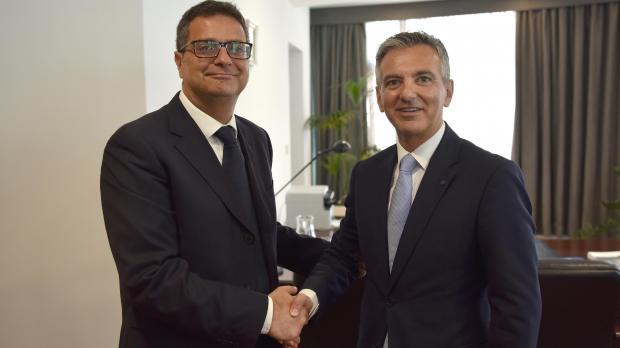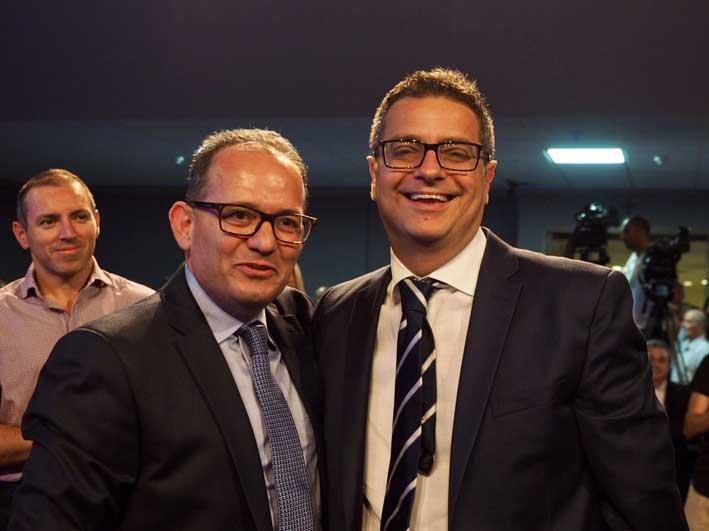It will take a generation, probably more, for the Nationalist Party to recover from its present mess – unless, of course, it would have not already crumbled under the weight of its financial difficulties and leadership crisis brought about by years of maladministration and internal fighting.
The party, in disarray for more than a decade, has now even mastered the art of turning a good day into a bad one. Hours after scoring what should have been a significant victory with the publication of a National Audit Office report highlighting “collusion” in the deal reached by the government for the transfer of three public hospitals, Adrian Delia lost a confidence vote instigated by his own MPs.
Delia is spearheading the fight for the hospitals deal to be revoked, including in the courts of law. What should have spurred the PN into mounting more pressure on the government was instead pushed to the side as the majority of the members of the parliamentary group voted against retaining Delia as Opposition Leader. On the same night, that is.
Many thought it was the end of the road for Delia, but he remained defiant and does not want to step down. He continues to insist that he has the backing of the party paid-up members who elected him in 2017, a decision that was confirmed last year. This opened up an unprecedented scenario and constitutional quandary as we are getting closer to having, at least temporarily, the possibility of having different persons holding the positions of Opposition Leader and PN leader.
With the ball rolling after Tuesday’s parliamentary group vote, the rebel MPs took matters further and nominated Therese Comodini Cachia as their choice for Opposition Leader to replace Delia. They went to propose her name to the President of the Republic, George Vella, requesting his intervention to relieve Delia of his duties and appoint Comodini Cachia in his stead.

But the situation gets murkier as it is unclear whether the Constitution provides for such a scenario. The Constitution is not specific on what should be done, and therefore is subject to interpretation. Constitutional experts whose advice was sought by the rebel MPs say that in the prevailing circumstances, with the majority of the MPs against him, Delia should be removed. But the legal snag remains as the articles pertaining to the appointment of the Opposition Leader are not clear enough.
PN deputy leader Robert Arrigo has suggested that one way out of this is for the rebel MPs to resign from the PN, set up a larger group than the PN on the Opposition benches, and nominate a new Opposition Leader. In other words, an official split of the party.
This is a possibility that had been mentioned in the past and which has never been as close to happening as it is today, given the events that took place in the last few days. The rebel MPs say going separate ways is not on the agenda, but the situation is developing quickly and may take new turns. The idea to remove Delia from the post of Opposition Leader may only be the first step, to be followed by a process within the party to kick him out as PN leader too. If they succeed, the matter will be resolved; if not, we’re back to square one.
With the backing of the paid-up members, Delia insists he is the rightful Opposition Leader, as he is the leader of the largest party on the Opposition benches. The PN statute – which was unanimously approved only two weeks ago – lays down that the party leader should be Opposition Leader when the party is in Opposition.
At a time when the PN should have made headway in popularity because Labour top officials resigned or were kicked out for reasons we all know about, it remains embroiled in an internal war that has been brewing for three years but which has now reached a point of no return. Now that we know the numbers – 19 of the 30 members of the parliamentary group, which includes the two MEPs, voted against Delia – it is difficult to imagine that there will be no political bloodshed, whatever the outcome of this impasse.

How we got here
Beware not the enemy from without but the enemy from within, American five-star general Douglas MacArthur once famously said.
Adrian Delia has had to contend more with what was thrown at him by people who supposedly sit on his side than from his political rivals. Each time there was even a small hint of accusation levelled at him, or a survey that showed him to be struggling to gain public confidence, forces from within the Nationalist Party he leads rose against him.
Since taking over as PN leader in September 2017, Delia has resisted several calls for his resignation. At one point, this time last year, his detractors even forced a vote of confidence, which he eventually won. But this did not stop the rebel MPs, those who have persistently advocated for him to step down or be removed, from furthering their efforts.

Adrian Delia could make it to the Nationalist Party leadership only because his predecessor, Simon Busuttil, changed the way a PN leader is elected. Until Busuttil’s own election, only councillors could vote to elect the leader, but under Busuttil’s leadership the PN widened the process to include the paid-up members, the so-called tesserati. Delia was a favourite with the grassroots, who saw in him as a chance to start afresh with someone who was coming from the outside of the party, which had suffered two successive massive national election defeats, the first under Lawrence Gonzi, and the second under Busuttil.
Delia was popular among the tesserati, but it was not the same story when it came to the party’s top brass. Even before his election as party leader, there had been strong attempts to discredit him – which top officials and MPs endorsed, but which strengthened the will of the members to give him a chance, also because they saw a kind of “establishment” working against him. In the run-up for the leadership, the party was already divided between the grassroots who endorsed Delia, and a sizeable group of top PN officials, including MPs, who did not want him as their leader.

After the 2017 leadership election
The antagonism against Delia from within his own party did not stop after he beat Chris Said, the establishment’s favourite, in the election. If anything, it got worse. For Delia, it was a tough uphill struggle all the way for the last three years or so. More political arrows were shot at him from people at Pieta than those based in Hamrun. There were times when, in an attempt to show unity, Delia defended MPs under fire when these same MPs were then the first to turn their proverbial backs to him, and attack his leadership. Delia made his own crucial mistakes too, such as when he tried to sideline his predecessor Simon Busuttil after the publication of the conclusions of the Egrant inquiry.
The rebel MPs accuse Delia that he is the reason why the PN has not made any headway in popularity in spite of the scandals that have rocked the Labour Party and brought about the resignation of Prime Minister Joseph Muscat and an election to replace him. They told him that in three years he was unable to unite the party and bring back people who had left the party.
But the Delia group argues that these MPs greatly contributed to this division, as they never accepted Delia as their leader. Often, Delia was on his own even in his more glorious moments (such as when he won the right to have a copy of the Egrant report and published it, and more recently with regard to the Vitals hospitals deal). From their point of view, the rebel MPs were doing it in the best interests of the party. Little by little, they ate away at Delia’s closest allies in the party, some of whom were forced out, until they felt strong enough to pick on an opportunity to insist that a vote of confidence is taken.
Delia has said it in public that each time the PN was earmarked to score some political points against Labour, a story surfaces to put his leadership in jeopardy, strongly hinting that it is people at Pieta who pass on information to friendly media. It’s as if, Delia suggests, the people around him do not want him to make progress.
Robert Arrigo, deputy leader, went as far as to say this week that there were occasions when party fund-raising activities had to be postponed because internal issues were timed to crop up just before they were about to be held.
Stubborn
Anyone in Delia’s place would have probably called it a day a long time ago. Week after week, month after month, his leadership has been put in doubt and no matter how much he tries to push himself as the man who is bringing about a reform in the party via the recently approved changes to the statute, his credibility has been dented too much for him to be able to convince the electorate that he would lead a better alternative government.
It is true that he was elected by the tesserati, but Delia should be clever enough to see the wider picture, and not simply rely on what the more fanatical faction of the PN says. Surveys have regularly shown that the PN lags heavily behind Labour, while Delia is far less trusted than Prime Minister Robert Abela, just as much as he was less trusted when Joseph Muscat was PM. It is not only the tesserati who vote in national elections.

Rebels
For the past three years, rebel MPs have questioned Delia’s leadership, but none of them has ever had the courage to challenge him for it. The nomination of Therese Comodini Cachia as Opposition Leader seems to be only an interim solution and, once all this is over, the real battle for the leadership (the PN or the splinter group) will start.
One of the MPs who want Delia out, David Thake, has said that the attempt is to remove the “monster” trying to hijack the party. Reversing the argument, Arrigo, who is backing Delia, said that the rebel MPs are acting undemocratically because they did not accept the vote of the tesserati three years ago. What Arrigo is suggesting is that it is the rebel MPs who want to hijack the party, not Delia, who was “democratically elected on rules set up by someone else”.
Supporters
Traditional PN voters have said that they are not prepared to vote for the PN again with Delia as leader. But now there are other PN traditional voters who say that they are the ones who will not vote if Delia is ousted.
Whichever way it goes, the PN stands to lose. This situation has created a huge vacuum in Maltese politics, with many people now considering themselves as political orphans. There is no way they can ever vote Labour, do not consider third parties as an option, but will not vote PN – either because Delia is leader or because he has been removed.